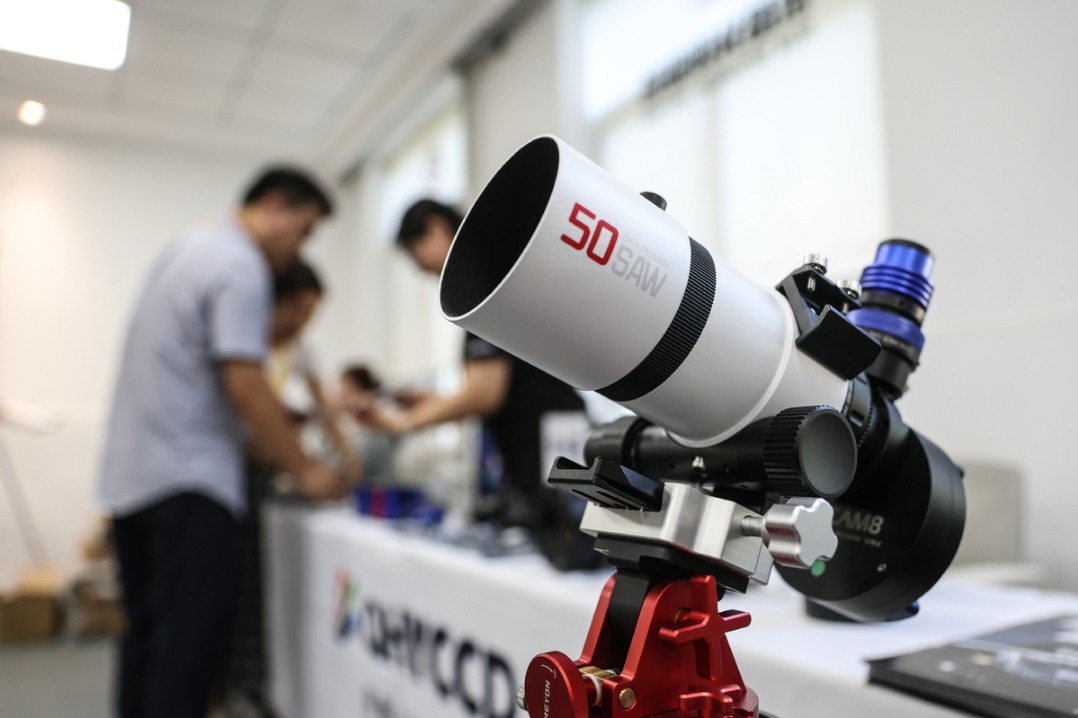Partnerships key to tapping markets


Hong Kong enterprises are extending links with their counterparts in ASEAN and in Middle East countries. However, they are advised to make long-term commitments and adopt bespoke strategies if they want to foster solid cooperation and ensure sustained competitiveness. Oswald Chan reports from Hong Kong.
Editor's note: Hong Kong has strategically expanded its focus to include the thriving economies of Southeast Asia and the Middle East, a tactical move that has generated a wave of opportunities for the city's vibrant business community. In the first of a three-part series, we explore how Hong Kong financial technology firms leverage their established strengths to gain a foothold in these regions.
Pan-Asian financial technology company WeLab entered the Indonesian market five years after its inception in 2013. In 2018, the startup launched Maucash, focusing on digital lending in Indonesia - two years before it inaugurated WeLab Bank in the Hong Kong Special Administrative Region. WeLab teamed up with Indonesian financial services company Astra Financial in 2022 to secure a stake in PT Bank Jasa Jakarta. In November, the bank set up its digital banking arm, Bank Saqu, which managed to secure more than 200,000 customers within two months.
Indonesia's young, unbanked population was a magnet for WeLab, which picked the country as the first market in the 10-member Association of Southeast Asian Nations to introduce its own inclusive fintech services brand.
In Malaysia, WeLab adopts a business-to-business model. By leveraging its fintech experience and HSBC Holdings' international connectivity and business presence in the Southeast Asian nation, WeLab uses its proprietary fintech technologies to help HSBC Holdings develop new digital bank products and services for the bank's retail customers in Malaysia.
WeLab is also eyeing the potential of Vietnam's fintech market as the company is studying whether the Malaysian B2B model can also be applied in Vietnam. Other ASEAN member states, like Thailand and the Philippines, are investment targets too.
ASEAN - a political and economic grouping comprising Brunei, Cambodia, Indonesia, Laos, Malaysia, Myanmar, Singapore, Thailand, the Philippines and Vietnam - is the world's fifth-largest economy with a GDP of $3.9 trillion in 2022.
Tailor-made plans
Simon Loong Pui-chi - WeLab's founder and group CEO - says the company's operations in Indonesia thrive on business differentiation, market penetration, technology scalability, and a partnership model.
Each ASEAN member state has its own language, customs, culture, tradition and regulations. "ASEAN is not a single market. Each ASEAN member has different business landscapes with different established banking institutions and business conglomerates. Enterprises need to study each ASEAN member state very deeply before venturing into the market," he tells China Daily.
WeLab adopts a broad and deep strategy with an in-depth approach, as fintech business requires technology, regulations, risk management techniques, as well as connectivity with local banking and payment systems.
"We have scaled up the technology and experience gained from our operations in Hong Kong and on the Chinese mainland, such as offering diversified products and services, risk management techniques, credit scoring and anti-fraud technology, as well as KYC (Know Your Customer) procedures, to develop the Indonesian market, whereas the business focus is on how to lure more prospective customers to open their first banking accounts with us," says Loong.
Digital banking solutions can be found in every market since the banking needs of the young generation in each ASEAN member state are similar, he says, emphasizing the need to find the right partner in developing any ASEAN market. "Local business partners can offer their insights and knowledge about the market, while Hong Kong businesses can provide international perspectives, execution capability and technology know-how. The partnership is the best winning formula that combines both elements."
Astra Financial is the financial services arm of Indonesian business conglomerate PT Astra International Tbk. Operating across nine financial services segments, the subsidiary company has over 24.7 million customers, with more than 29,000 employees and 910 networks in the country.
Loong stresses it is important for Hong Kong enterprises to show their long-term commitment to a particular ASEAN market. "You have to prove you are willing to make a long-term investment and deep penetration in that market, and are not just thinking about making a speculative short-term profit."
He is optimistic that Hong Kong fintech solutions are in demand by ASEAN financial institutions. "The rise of digital banks will put pressure on ASEAN's traditional banks to look for digitalization. Moreover, the young generation in the region embraces digital banking."
WeLab's recipes for success are in line with the views of the Hong Kong Trade Development Council and Singapore-based United Overseas Bank.
In a report titled "Navigating Connectivity: Exploring ASEAN Opportunities for the Greater Bay Area", the HKTDC and UOB identified navigating local government policies and regulations, overcoming cultural or language barriers, and difficulties in sourcing for employees with the required expertise as the three main challenges for companies from the Guangdong-Hong Kong-Macao Greater Bay Area planning to expand into ASEAN markets.
The report said regional economic integration initiatives, such as the Regional Comprehensive Economic Partnership, digitalization, and cost management will be essential for GBA-based firms to succeed in any ASEAN market.
It also highlights the importance of Hong Kong as a superconnector in bridging ASEAN and the GBA. And, the HKSAR has to go beyond that by positioning itself as a super value-adder.
Chief Executive John Lee Ka-chiu led a high-level delegation to Indonesia, Malaysia and Singapore in July, further bolstering reciprocal economic, trade and investment ties between Hong Kong and ASEAN.
So far, up to 650 ASEAN enterprises have set up local and regional offices and regional headquarters in Hong Kong. Since 2010, ASEAN has been Hong Kong's second-largest merchandise trading partner, and the city's sixth-largest inward direct investment source, and third-largest outward investment destination in 2021.
New role
"Hong Kong should act as superconnector, and focus on finding the right solutions, as well as working and collaborating with regional governments," says Christine Ip Yeung See-ming, UOB's managing director and Greater China CEO.
"We do not see Hong Kong as merely a middleman. Now, with the rise of e-commerce and digitalization, ASEAN does not require a middleman. Instead, they want Hong Kong to be an integral part of the value chain, adding value through its professional talents, top-notch international universities, strong legal framework and low tax rates," says Ip.
"We are entering another phase of co-creation as ASEAN member states are turning from manufacturing outsourcing agents to end-consumer markets. ASEAN is a new market, but is a highly competitive one," says HKTDC Deputy Director of Research Louis Chan Wing-kin.
He notes that even Chinese mainland e-commerce giants have entered into partnerships with ASEAN companies to obtain their local expertise in overcoming hurdles in the ASEAN market. "As ASEAN becomes a major market, we have to be very careful with local regulations and business practices, and work with all stakeholders in different markets."
Hong Kong virtual insurers are also scrambling to tap ASEAN markets.
Singapore-based OneDegree Global - a technology company under homegrown virtual insurer OneDegree Group - has developed its insurance technology platform IXT. It has teamed up with insurer Insurlog to offer businesses integrated insurance solutions in Vietnam, covering loss, damage, or delays in goods transportation in the supply chain.
OneDegree Group Co-founder Alvin Kwock Yin-lun says several Malaysian insurance companies are adopting the IXT platform to develop insurance business lines in the healthcare, pets, auto and e-commerce sectors.
OneDegree Global has invested in Eazy Digital - a Bangkok-based software-as-a-service (SaaS) platform to enhance lead management, automate labor-intensive tasks, and offer real-time insights into key performance indicators and service level agreements for insurance companies and brokers.
"ASEAN's young population is growing rapidly, which is favorable for fintech companies seeking business development. However, regulatory risks in these countries are relatively high as policies may change. ASEAN states do not emphasize long-term, top-down economic development blueprints as China or Middle Eastern countries do," Kwock tells China Daily.
While OneDegree Global focuses on insurtech to help insurers in digital transformation in ASEAN, OneDegree Group's other subsidiary company, OneDegree HK, which was licensed in 2020, has launched its proprietary insurance products in the Middle East.
In December, OneDegree HK - Asia's first licensed insurer for digital assets - joined Dubai Insurance to introduce the Hong Kong company's OneInfinity into the United Arab Emirates to offer digital asset insurance products in commercial liability insurance, particularly professional indemnity and directors and officers insurance, and, possibly, custodial wallet insurance in the future.
Established in 1970, Dubai Insurance was the first national insurance company founded in the UAE, providing a wide range of insurance products and services in the country.
Kwock says, as a digital asset insurance product, OneInfinity is concerned with not just making financial payments concerning financial fraud related to digital assets but, rather, providing a whole package of risk management expertise and technology support. He says this will be a win-win scenario for financial regulators, insurers and clients because the most effective way to reduce and monitor financial fraud risks involving digital assets is to tackle them at source.
Dubai Insurance's role in the partnership is to provide its database and technology expertise for more business collaboration. Dubai Insurance and OneDegree Group have agreed to share payments arising from customers' claims.
The Middle East market generally refers to six countries bordering the Arabian Gulf - Bahrain, Kuwait, Oman, Qatar, Saudi Arabia and the UAE. "Middle Eastern countries are betting on transition from an energy-reliant economy to one that is diversified with emphasis on a rising young population, infrastructural upgrade, and attracting global capital, talents and technology. These are the potential of the Middle East market," says Kwock.
Fierce competition
Hong Kong companies, on the other hand, have to face various challenges when entering the Middle East market.
Although the six countries share similar languages and religions, running a business in each of them may be different. "Hong Kong fintech companies can expand to Qatar and the UAE more easily because these two countries have a large expatriate population. In Saudi Arabia, the population mix is highly dominated by locals, so Hong Kong enterprises have to rely on Saudi talents in developing the market," explains Kwock.
Hong Kong fintech enterprises must also be prepared for fierce competition with peer companies from around the world. They also have to ensure they have built up their market niches in respective fintech segments before setting foot in any Middle East market. "Middle Eastern countries do not want to be tested in fintech. They do not want pure technology startups, but rather scaled-up enterprises. These countries need the world's best technology and expertise," he says.
Hong Kong companies should also learn how to build up and maintain a long-term business relationship with Middle East companies. "The business culture of Middle East companies is similar to that of their Chinese mainland counterparts, with strong emphasis on a long-term relationship. Hong Kong enterprises should learn how to establish and maintain such a relationship, be it in technology exchange engagement or staff communication," says Kwock.
As part of their partnership, Dubai Insurance has made a strategic investment in OneDegree Group's Series B funding round.
Besides digital asset insurance, pet insurance is also the signature product of OneDegree HK. Kwock says the virtual insurer can also introduce Hong Kong's pet insurance business to the Middle East market.
"As the income per capita of Middle Eastern countries is quite high, it spurs demand for pet insurance from local and overseas expatriates in these countries which share similar lifestyles with Hong Kong's middle-class population."
Contact the writer at oswald@chinadailyhk.com
- Heavy rainstorm leaves three dead, four missing in Hebei resort
- Ethnic integration on the grassland
- China renews alerts for rainstorms, high temperature
- Beijing restores power, communications, water-supply to flood-hit villages
- Helicopter sightseeing project takes off over Wuliangsu Lake
- Court calls for judicial aid to inspire innovation





































